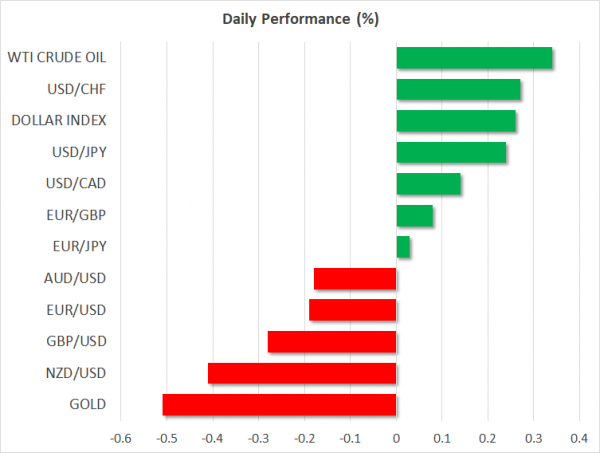- Dollar advances on US debt ceiling accord; may have more room to climb
- Boris Johnson to become new UK Prime Minister – watch his Cabinet picks
- Loonie and kiwi lose ground, earnings season fires up
Greenback catches a bid after US debt ceiling deal
Market movements were relatively subdued on Monday, with most major currency pairs trading in narrow ranges, without much in the way of news flow to guide the price action. Things became more interesting overnight though, after the White House and Democrats in Congress reached a deal on America’s debt ceiling, raising federal spending allowances and reducing the likelihood of a government shutdown.
The news put some wind back in the dollar’s sails, as the risk of political gridlock subsided. Traders could also be scaling back some of their euro exposure ahead of what promises to be a dovish-sounding ECB this week, amplifying the dollar’s gains. On the Fed side, markets still discount a ~20% probability for a ‘double’ rate cut at the July 31 meeting, which seems excessive.
In this sense, the risks around euro/dollar seem tilted to the downside for now, as besides the prospect of Draghi talking down the euro on Thursday, the dollar may also have more room to recover if bets for aggressive Fed action in July are gradually unwound.
Boris Johnson to become Britain’s PM; all eyes on his Cabinet picks
Without any tier-one data releases today, investors will keep their gaze locked on the UK, where Boris Johnson is expected to become the next Prime Minister. He has been quite vocal that the UK is leaving the EU in October with or without a deal, “come what may” – which has inflicted considerable damage on the pound lately.
This week, the Cabinet ministers he chooses may prove crucial for sterling. If he fills the top government positions with die-hard Brexiteers – like Jacob Rees-Mogg – that could further raise the perceived probability for a disorderly exit given their inflexible views, and therefore bring the pound under renewed pressure.
In the bigger picture, the outlook for sterling remains gloomy. There’s very limited potential for meaningful Brexit progress by October, and outside of that, the only thing that may be able to turn the tide is a General Election.
Loonie and kiwi surrender ground, earnings continue
Meanwhile, the Canadian dollar took a hit yesterday, after some disappointing wholesale trade data raised concerns for a weaker GDP print in Q2. Although this pullback may continue in the next days, especially if the US dollar advances further, the broader outlook for the loonie is still positive as long as the BoC remains unlikely to cut rates while other central banks are doing so.
In New Zealand, the local dollar is lower as well following reports that the RBNZ is looking at adding ‘unconventional’ policies to its toolkit. This is likely a hint that the central bank could use Quantitative Easing (QE) in the future, if it runs out of space to cut rates.
Elsewhere, the US earnings season goes into full swing, with the likes of Coca Cola, Lockheed Martin, and Visa being among the most notable names releasing their quarterly results today.
The IMF will also update its global growth forecasts, which if revised substantially lower, may generate risk aversion.

